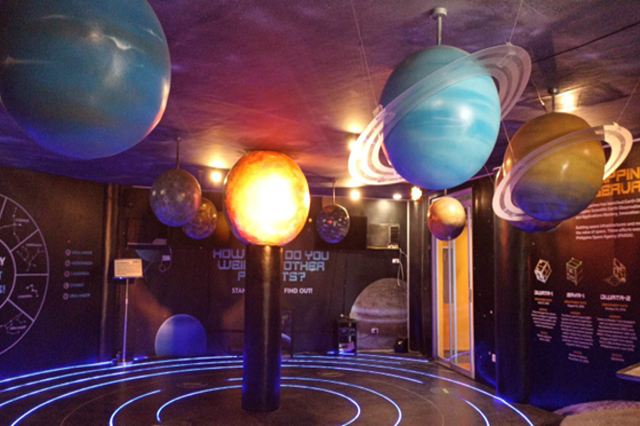The Department of Science and Technology and the Naga City local government unit officially reopened the Bicol Science and Technology Centrum (BSTC) on March 16, following a revitalization and improvement project that started in April 2021.

With a P6.9-million budget, the BSTC is now ready to cater again to local viewers, especially children, teachers, and even researchers and innovators, who can experience science by visiting the center.
DOST secretary Renato U. Solidum Jr. reminded the populace that such facilities would also be the best means of promoting science literacy and appreciation, particularly among younger students.
“Since BSTC was established in 1995, the Bicol Region has benefited from the services it has provided. As it was reopened this year, we planned to take advantage of it by leveraging science in the area in line with the inclusive, innovative, and integrated approaches we aimed for the department,” Solidum said.
Naga City mayor Nelson S. Legacion of Naga also expressed his enthusiasm for the center’s opening.
“The BSTC has always been a sight to look forward to as part of the cultural tourism in Bicol,” he said. “With its launch, we hoped to encourage young people in the area to pursue careers as researchers and scientists.”
The revitalized and improved BSTC will now house 50 interactive exhibits in five galleries, such as the following:
- Gallery 1: Marvels of Physics: Electricity, Magnetism, and Robotics. The gallery houses the advancements in technology made possible in robotics through electricity, magnetism, and robotics. The displays include: a robot exhibit, a plasma ball, a buzz wire, a drone exhibit, a van de Graff floating ball exhibit, an interactive screen, virtual reality, interactive gears, reaction time for two players, and a motion sensing screen.

- Gallery 2: Mysteries of the Universe Explained: The Solar System and Space Exploration. This section allows visitors to view the planet’s place in the solar system and beyond as mankind continues to explore the universe. The displays include all about planets, voyager distance display, constellation light tracing, weight on other planets, astronaut cutout, astronaut display, and the human gyro exhibit.
- Gallery 3: What Lies Beneath: Uncovering Earth’s Secret Featured. Exhibits are the volcano cross-section exhibit, sound domes and interactive display, coal mining, sand exhibit, rock display, interactive screen, volcano flip book facts, stalactites, and stalagmites.
- Gallery 4: Underwater Wonderland: Beneficial yet Threatened Aquatic Ecosystems. The gallery is comprised of the following displays: an interactive submarine, interactive fishes, marine life, ecosystem rotating panels, coral displays, a whale shark, a tsunami wave tank, an ocean pollution mural, a jellyfish exhibit, an octopus exhibit, a turtle and tortoise exhibit, a whirlpool exhibit, scuba gear 1 and 2, water reaction, and an earthquake simulator.
- Gallery 5: Land Ecosystem Unfold: Discovering Mother Nature Displays. The gallery includes an artificial tree or replica of a rafflesia, a nature texture exhibit, a windmill exhibit, a sand-filled area, farming tools, the Mt. Mayon and Mt. Isarog Lenticular Wall, a barnyard exhibit, and creepy crawlies.

Dr. Enrico C. Paringit, executive director of DOST-PCIEERD (the Philippine Council for Industry, Energy, and Emerging Technology Research and Development), who monitored the project, added that it is beneficial to have regional influences in our museums.
“In the case of DOST Region V’s BSTC, these are readily apparent in the attractive features of the galleries. If there are better examples, they can see that they are organic in their area, especially for kids, it is easy to appreciate and understand science. This fantastic feature is provided by the center,” he said.
DOST V regional director Rommel R. Serrano also expressed his gratitude that the center will finally have a rebirth since it was closed in 2016, and it is anticipated to attract twice as many visitors as in previous years.
“We anticipate a very positive response from our students, teachers, and the local community, particularly from the people of Naga who have observed the impact on students’ appreciation of science over time. With the center, we hoped to inspire not just the town but also the surrounding areas to establish their own science centers.”
The center is open to the public, and group tours and walk-ins are both welcome Monday through Friday from 8 a.m. to 5 p.m. For further information, call 0919-914-8858, send an email to bstc@naga.gov.ph, or visit the Naga website at www.naga.gov.ph.




